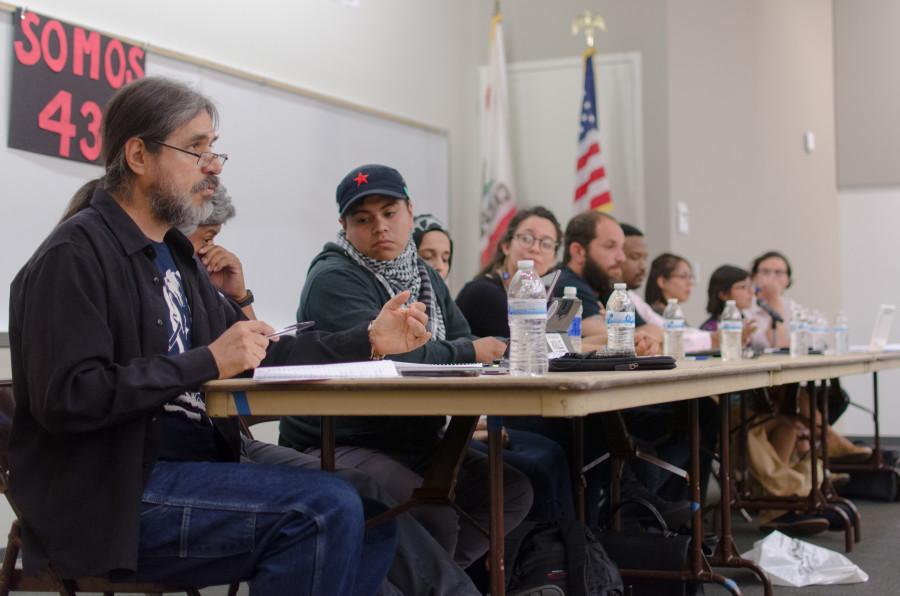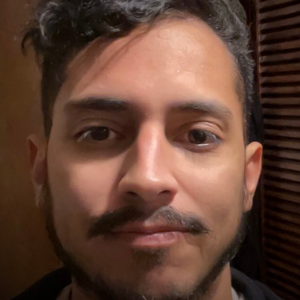City College sheds light on social justice
Students from the support movement for Ayotzinapa, Mexico, expand on types of changes in an open forum on March 26 in building V-101. The panel expands and diversifies with those representing similar causes, such as, topics arising in Palestine and American Black culture. Photo credit: Richard Lomibao
April 21, 2015
Mayra Almaraz tearfully recounted how her ex-boyfriend is serving a life sentence for a botched robbery due to the three strikes law. Almaraz shared her story in MS-462 during the afternoon session of the second day of the first Social Justice and Education Conference held at San Diego City College on March 26 and 27.
Attendees were asked to get into groups of four to six and each member of a group to state what they are passionate about in society to illustrate the power of conversation to bring about social justice.
During a brief sit-down with City College President Anthony Beebe, he expressed what he wanted attendees of the conference to get from it — to know that City College is a national leader of social justice, social justice is not political or economic, and to help define social justice as a unified idea to positively impact the communities of City College and San Diego.
“Community colleges started out with a mission of social justice. The whole idea of having open doors for all who are interested in learning was a new concept when they started back in the early 1900s,” Beebe said. “The social justice conference is really all about how education and social justice meet and come together and how they can compliment each other. The idea of us having a social justice conference at a community college makes a lot of sense.”
Day 1
Each day of the conference opened with registration and self-serve breakfast outside the Saville Theatre. Registration consisted of attendees going to the tables set up in front of the theater and once their name was confirmed, they were given a bag with programs and end of conference surveys.
Thursday, the conference opened with a ritual led by Erin Charlens, a member of the Umoja Governing Board, and Ernie McCray, a poet, activist and retired principal of the San Diego Unified School District. Beebe welcomed attendees and Constance Carroll, chancellor of San Diego Community College District, was the featured speaker.
Day 2
On the second day, the topics of poverty and racial inequality in the educational system were presented by featured speaker Tyrone Howard.
Howard is the faculty director of Center X, the founder and director of the Black Institute, and professor of education at the Graduate School of Education and Information Studies at UCLA. He has written various works on the topic, such as “Why Race and Culture Matters in Schools: Closing the Achievement Gap in America’s Classrooms,” and “Race, Ethnicity, & Education.”
Howard explained that community colleges represent democracy more accurately than other four-year universities. Unlike those universities, community colleges do not require SAT or ACT scores.
He compared community colleges with his home school, UCLA, and claimed that UCLA is not representative of the city of Los Angeles nor the entire state of California.
Howard demanded that the audience take a look at our institutions. He posed the argument that the same institutions that often claim to help sometimes create the obstacles themselves.
“We need to recognize that poverty matters,” Howard said.
According to the statistics he presented during his presentation, 50 million people living in the U.S. live in poverty and 16.5 million of those in poverty are children.
Of those children who live in poverty, he argued, most of them are more likely to not attend preschool, attend low performing schools and perform worse in school and drop out of high school.
“Certain schools feel like prison,” he said. “It sends a powerful message that we don’t care about you,” he argued. He later went on to compare those impoverished institutions to schools in wealthy communities to make a visual statement of the wealth inequality in those institutions.
He continued his presentation, talking about race in the educational system.
“If educators aren’t going to have real honest, sustained critical conversations about race we are going to continue to see the kind of gap we see between African-American and Latino students,’’
Howard explained. “Our series of studies that we’ve done where we have seen schools that have closed the achievement gap, one of the crucial things that they’ve done in these schools is that they’ve taught very delivery about race.” Howard reached the end of his speech by presenting his call for action: “What we need is transformative social justice education.”
He argued that although the obstacles are set by our institutions it does not mean it should stop youths from educating themselves and that it’s important to “reclaim sense of self.”
He brought up intersectionality and the importance of acknowledging poverty, race, gender and feminism. He ended by remarking the importance of educating ourselves on all these topics.
“Believe it or not, he’s actually gone through a lot. I mean he grew up in South Central L.A., he knew how everything was like, so at least we have someone who lived to tell about it,” Miramar College student and audience member Harris Bhatti said, sharing his insight on the speech and Social Conference overall.
The conference concluded with a visit to Tijuana’s maquiladoras to learn the actual conditions and struggles of workers.












Pyntorel • Apr 24, 2015 at 6:26 pm
That is so true, Brezyl! And speaking of the Department of Fair Employment and Housing, that state office used to recognize an area of discrimination in employment that involved harassisng and/or discriminating against an employee or applicant due to a relative of that person being employed in civil service, be that civil employment city, county, state, or federal. That’s entirely gone now, has been since ’98 or so. Really, the DFEH moves around town so much now it’s hard to catch. But if that was an area of discrimination in the past, what has changed? Why isn’t it now? Has civil service become so enlightened there simply is no persecution of an employee in the private sector if his or her brother is, say, a state employee? Well, that’s reassuring.
And here is a recent effort of the EEOC to make amends for possible errors in its past: http://www.insurancejournal.com/news/national/2015/03/18/361149.htm
Why, of course we know the EEOC will right all wrongs now. We are in safe hands! The EEOC’s cowbell of freedom will always ring loudly in San Diego no matter where the EEOC moves its office to! Where is it now, anyway?
Brezyl Notigly • Apr 22, 2015 at 2:05 pm
And it’ll all get worse now that the Board of Supervisors has enacted Laura’s Law: http://www.10news.com/news/investigations/san-diego-county-board-of-supervisors-votes-to-implement-lauras-law
Randy Hagar drafted Laura’s Law ‘way back after 9/11, and even back then only one county in the state used it. Why San Diego would need this law now no one knows, but now everyone can be arrested for swearing out loud after being stung by a bee or mosquito, for yelling at a stray dog to keep it away, or by saying “Ooh, wowsy!” at a flower. It’s honestly that bad.
We have to realize that some of the lobbyists that have contact with our politicians may not be suited for that contact. Here we have Hagar.